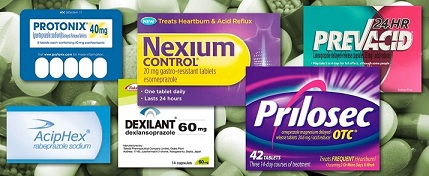U.S. Study Shows That Users Of Proton Pump Inhibitors or PPIs Have Higher Mortality Risk When Infected With COVID-19
Source: COVID-19 And PPIs Aug 16, 2021 3 years, 8 months, 4 days, 5 hours, 9 minutes ago
A new study by American researchers from multi-institutions led by the University of Arkansas for Medical Sciences and also involved University of Mississippi Medical Center, University of Louisville School of Dentistry University of Florida, Brigham and Women's Hospital-Boston, Boston Children's Hospital and University at Buffalo among many others, has found that users of PPIs or proton pump inhibitors have a higher mortality risk when they are infected with the SARS-CoV-2 coronavirus and develop the COVID-19 disease.
 Proton pump inhibitors (PPIs)
Proton pump inhibitors (PPIs) are a class of drugs used to treat GERD, peptic ulcers, and H. pylori. Examples of PPIs include Prilosec, Prevacid, Aciphex, Pantoprazole, Lansoprazole, Esomeprazole (Nexium), Omeprazole (Miracid) etc.
The study findings were published in the peer reviewed American Journal of Gastroenterology.
https://journals.lww.com/ajg/Fulltext/2021/08000/Increased_ACE2_Levels_and_Mortality_Risk_of.17.aspx
It should be noted that already prior to COVID-19, the usage of PPIs were found to be associated with community-acquired pneumonia.
https://pubmed.ncbi.nlm.nih.gov/19470989/
https://pubmed.ncbi.nlm.nih.gov/28715344/
https://pubmed.ncbi.nlm.nih.gov/29676433/
Previous studies had shown that proton pump inhibitor (PPI) use associated with increased severe acute respiratory syndrome coronavirus 2 (SARS-CoV-2) infection and worse clinical outcomes. The underlying mechanism(s) for this association are unclear.
https://pubmed.ncbi.nlm.nih.gov/32852340/
https://pubmed.ncbi.nlm.nih.gov/32608546/
https://pubmed.ncbi.nlm.nih.gov/32732368/
The research team performed a prospective study of hospitalized coronavirus disease 2019 (COVID-19) patients and COVID-negative controls to understand how PPI use may affect angiotensin-converting enzyme 2 (ACE2) expressions and stool SARS-CoV-2 RNA.
Detailed analysis of a retrospective cohort of hospitalized patients with COVID-19 from March 15, 2020 to August 15, 2020 in 6 hospitals was performed to evaluate the association of PPI use and mortality. Covariates with clinical relevance to COVID-19 outcomes were included to determine predictors of in-hospital mortality.
Alarmingly, the study findings showed that control PPI users had higher salivary ACE2 mRNA levels than nonusers, 2.39 ± 1.15 vs 1.22 ± 0.92 (P = 0.02), respectively. Salivary ACE2 levels and stool SARS-CoV-2 RNA detection rates were comparable between users and nonusers of PPI.&l
t;br />
It was found that in 694 hospitalized patients with COVID-19 (age = 58 years, 46% men, and 65% black), mortality rate in PPI users and nonusers was 30% (68/227) vs 12.1% (53/439), respectively. Predictors of mortality by logistic regression were PPI use (adjusted odds ratio [aOR] = 2.72, P < 0.001), age (aOR = 1.66 per decade, P < 0.001), race (aOR = 3.03, P = 0.002), cancer (aOR = 2.22, P = 0.008), and diabetes (aOR = 1.95, P = 0.003). The PPI-associated mortality risk was higher in black patients (aOR = 4.16, 95% confidence interval: 2.28–7.59) than others (aOR = 1.62, 95% confidence interval: 0.82–3.19, P = 0.04 for interaction).
The study team concluded that COVID-negative PPI users had higher salivary ACE2 expression which made then more susceptible to SARS-CoV-2 infections while PPI use was associated with increased mortality risk in patients with COVID-19, particularly African Americans.
It is highly recommended that current PPI users consult their doctors about the possibility of switching to H2 receptor antagonists ie another class commonly prescribed anti-secretary agent as it was reported to offer protective effects and improve outcomes in hospitalized patients.
https://pubmed.ncbi.nlm.nih.gov/32446698/
An example of a H2 receptor antagonist would be Famotidine.
https://www.thailandmedical.news/news/covid-19-drugs-study-shows-common-and-cheap-heartburn-drug-famotidine-improves-outcomes-of-hospitalized-covid-19-patients
https://www.thailandmedical.news/news/breaking-studies-show-famotidine,-a-common-indigestion-drug-could-help-in-mild-to-moderate-cases-of-covid-19
https://www.thailandmedical.news/news/breaking-covid-19-treatments-second-observational-study-shows-famotidine-associated-with-better-outcomes-for-hospitalized-covid-19-patients
https://www.thailandmedical.news/news/covid-19-treatments-study-shows-using-dual-antihistamines-such-as-cetirizine-and-famotidine-helps-pulmonary-symptoms-in-covid-19-patients
It should be noted that this is not the first study to link PPI usage to increased mortality in COVID-19 patients. A previous study covered by Thailand Medical news by Malaysian researchers also showed the same findings.
https://www.thailandmedical.news/news/covid-19-warning-malaysian-led-research-shows-that-gastric-reflux-drugs-ppis-linked-to-increased-risk-of-severe-or-fatal-covid-19-outcome
For more about
PPIs and COVID-19, keep on logging to Thailand Medical News.
